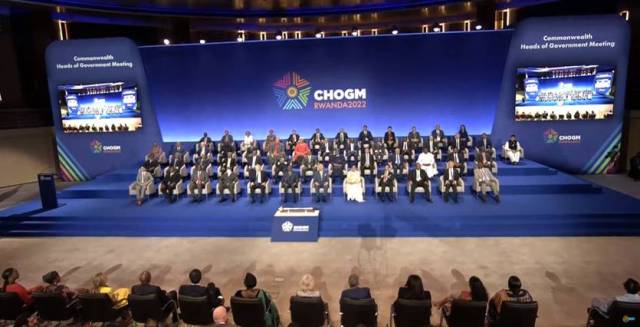 [photo from live coverage of CHOGM 2022 opening ceremony]
[photo from live coverage of CHOGM 2022 opening ceremony]
[This article is from The Round Table: The Commonwealth Journal of International Affairs.]
CHOGM Rwanda 2022 was a very African affair, and an important reminder that, of the 54 members of the Commonwealth, 19 were from the African continent. With the recent addition of two more – Gabon and Togo – bringing the total to 56, Africa’s predominance has increased to well over a third of the membership.
As we all know, this particular Commonwealth Heads of Government Meeting had been a long time in coming. Delayed by two years because of the COVID-19 pandemic, the choice of Rwanda as host signified a first: not only was Rwanda the newest member of the Commonwealth, having joined in 2009, but it was also the first country without a British colonial past to host CHOGM.
With twice the amount of time to organise than would have been normal, Rwanda’s capital, Kigali, was well prepared. All the major hotels appeared to be in pristine condition, as was the Kigali Convention Centre (KCC): looking like a beehive, it was opened in 2016 at the cost of $300 million. With the variegated flags of the member countries on full display, the KCC’s most important function was as the venue for the Opening Ceremony held on a brilliant sunny morning in Kigali.
Kigali notes: CHOGM Diary from the Round Table Chair – Foreign Ministers’ Roundtable with Civil Society
Kigali notes: Diary from the Round Table Chair – CHOGM 2022: the leaders meet
Kigali notes: CHOGM Diary from the Round Table Chair – Guilt and Genocide
Kigali notes: CHOGM Diary from the Round Table Chair – arrival
Of all the speeches – by President Paul Kagame, host and incoming chair-in-office, the Secretary-General, Rt Hon the Baroness Scotland, Patricia Scotland and Prime Minister Boris Johnson, the outgoing chair-in-office – that of HRH Prince Charles, representing his mother, Her Majesty The Queen, as Head of the Commonwealth, created the most social media traffic. Mindful that he was speaking in Africa, from whose shores over a period of nearly 400 years an estimated 12.5 million people were transported as slaves to America and the Caribbean, his comments struck a chord. Even those who would like to see an end to the Royal Family’s association with the Commonwealth, had to concede the boldness of the Prince’s admission of his ‘personal sorrow’ at the suffering of so many, as he understood more about ‘slavery’s enduring impact’.
What was also striking was the high-level presence of the Commonwealth’s ‘Small States’ – of which most are in the Caribbean and the Pacific – many of whom observed the protocol of actually sending their heads of government; this contrasted with both Australia and New Zealand who sent a substitute, as did South Africa, India and Pakistan. Their attendance seemed illustrative of the importance which small state leaders attach to membership of the Commonwealth both as a forum in which their voices can be heard and to promote issues of critical importance to their survival, especially in relation to climate change and the environment.
But despite the spectacle, there were some uncomfortable undercurrents. Firstly, would the attempt to replace the Secretary-General by a contending candidate, Kamina Johnson Smith, foreign minister of Jamaica, succeed? Although, as we now know, the endeavour (which the UK had supported) failed, until the result was announced the subject occupied the room like the proverbial elephant. Another issue was whether the Rwandan government would be embarrassed by criticism of its human rights record and the claim that all political dissidents are muzzled (or worse). Yet again, the atmosphere remained cordial, although an article headlined ‘Rwanda is a brutal repressive regime. Holding the Commonwealth Summit there is a sham’, written by Africa commentator, Michela Wrong, and published by the UK’s Guardian, was being passed around on WhatsApp. Even the furore over the UK sending refugees to Rwanda ran out of steam. And I was impressed to learn that Shabana Basij-Rasikh, the Afghan co-founder of SOLA (School of Leadership Afghanistan), the only girls boarding school in Afghanistan, had relocated the school to Kigali following the Taliban takeover in Afghanistan in August 2021.
The House of Lords assess the post-CHOGM “evolving Commonwealth”
Samoa’s CHOGM will ‘refocus Commonwealth on small states’, says Fiamē
I also had to applaud – despite the continual debate over whether the Commonwealth is an organisation which upholds the values expressed in its Charter or whether it is ‘a Commonwealth of nothing’ – the enthusiasm of all the delegates, both at the large and small activities. The forums – Peoples, Youth, Women and Business – as well as numerous side-events, were testimony to the importance of continual dialogue, with a range of participants expressing diverse and coincidental viewpoints.
Most significantly, whatever reservations there may have been about Rwanda hosting CHOGM, it was hard not to recognise the country’s progress since the 1994 genocide, the horror of which remains embedded in the Rwandan psyche. It spoke volumes that, in the brief time available, the foreign delegates, including Prince Charles and the Duchess of Cornwall, made time to visit the Kigali Genocide Memorial, with its harrowing displays of death, torture and mutilation, its flame of remembrance, gardens of unity, division and reconciliation, and its concrete slabs under which the remains of 250,000 Rwandans – a quarter of those who were slaughtered – lie buried.
Victoria Schofield is the chair of the Round Table editorial board.



